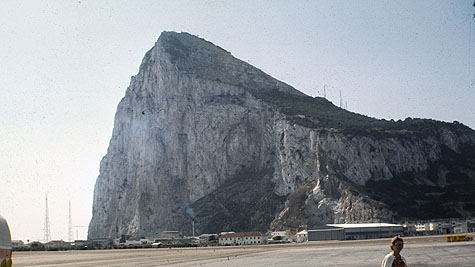HIS 102
Unit 9: Imperialism

The
Rock of Gibraltar, a 55 million-year-old piece of limestone sticking up
in the air at the western end of the Mediterranean Sea.
Although not quite dating to the imperialist era of the late nineteenth
century, is there a better symbol of the overseas British Empire than
the Rock of Gibraltar which the British captured way back in
1704? The Treaty of Utrecht (1713), which ended the War of the
Spanish Succession--a major defeat for Louis XIV--ceded Gibraltar to
the United Kingdom. England has repeatedly refused to part
with it since Gibraltar controls the straits of Gibraltar and access to
the Mediterranean. Photo courtesy C. Wayne and Dorothy Miller
 What you
must do in this unit
What you can do in this unit
Some videos that you can watch for this unit
Extra Credit Options
What you
must do in this unit
What you can do in this unit
Some videos that you can watch for this unit
Extra Credit Options
- Take the short 5-point quiz for chapter 22. Log into Blackboard and look under "Chapter Quizzes." You have five minutes to complete each quiz (multiple-choice questions).
- For a maximum of 50 points extra credit, review these sources (The Earl of Cromer, Why Britain Acquired Egypt in 1882
(1908); Wilfred Scawen Blunt: Britain's Imperial Destiny (1896-1899); Anthony Trollope: The Diamond Fields of South
Africa (1870)) and write a short paper examining the colonial experience. Please be sure to include quoted material.
- Explore life in the United States at the turn of the century. Check out the Slatington News Project and write the paper for a maximum of 50 points (maybe more points if the paper is great!).
- Explain the outcomes of the
Berlin Conference of 1884-85 in a one-page paper for a maximum of 50
points extra credit. Please be sure to cite your sources.
- Was there an "Impressionism" movement in
music and literature? Write a one-page paper for a maximum of 50 points extra credit.
- Watch Breaker Morant
and write a one-page
paper assessing the historical accuracy of the movie for a maximum of 50
points extra credit.
- What was the extent of
and justification for
American imperialism at the turn of the twentieth century? Answer that question
in a long paragraph for a maximum of 25 points extra credit--maybe more-- (Use some of the resources available at
www.fordham.edu/halsall/mod/modsbook34.html.).
- Read Lenin's
Imperialism and
explain his main revisions to Marx's theory of socialism in a short paper (1-2 pages)
for a maximum of 50
points extra credit.
- For a maximum of 25 points extra credit, read Captain F. D. Lugard, The Rise of Our East African Empire
(1893) and write a long paragraph explaining the rationale for the British empire in Africa.
- For a maximum of 25 points extra credit, read Simón de Bolívar (1783-1830): Message to the Congress of
Angostura (1819) and write a paragraph in which you examine Bolivar's rationale for his resistance and his political ideas.
- For a maximum of 25 points extra credit, read the Monroe Doctrine (1823) and write a paragraph in which you explain the justification for American imperialism.
- For extra credit of a maximum of 10 points,
you can submit the answers to the Achebe study questions. Please write in formal, complete sentences.
- For extra credit, please suggest a
relevant website for this unit of the course. Send the title of the site, the url and a
brief explanation why you find the information interesting and applicable to
the material being studied this unit.
|

